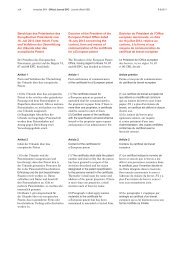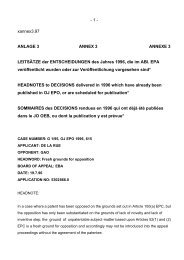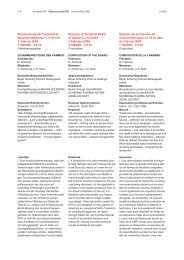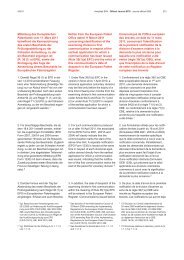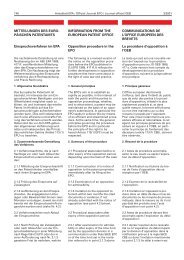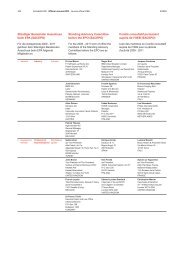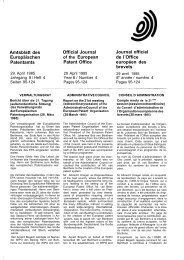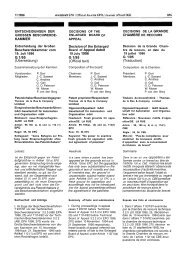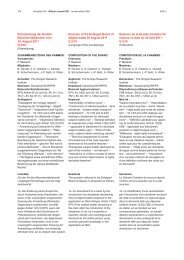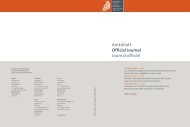Entscheidung der Großen Beschwerdekammer vom 23. Juli 2012 G ...
Entscheidung der Großen Beschwerdekammer vom 23. Juli 2012 G ...
Entscheidung der Großen Beschwerdekammer vom 23. Juli 2012 G ...
Create successful ePaper yourself
Turn your PDF publications into a flip-book with our unique Google optimized e-Paper software.
4/2013 Amtsblatt EPA Official Journal EPO Journal officiel OEB 195<br />
Sachverhalt und Anträge<br />
I. In <strong>der</strong> Sache T 1145/09 hat die Technische<br />
<strong>Beschwerdekammer</strong> 3.5.03 mit<br />
Zwischenentscheidung <strong>vom</strong> 17. Juni 2010<br />
<strong>der</strong> <strong>Großen</strong> <strong>Beschwerdekammer</strong><br />
folgende Rechtsfragen vorgelegt:<br />
1. Ist ein Antrag auf Berichtigung des<br />
Erteilungsbeschlusses nach Regel 140<br />
EPÜ, den <strong>der</strong> Patentinhaber erst nach<br />
Einleitung des Einspruchsverfahrens<br />
stellt, zulässig? Ist insbeson<strong>der</strong>e das<br />
Fehlen einer Fristsetzung in Regel 140<br />
EPÜ so auszulegen, dass eine Berichtigung<br />
von Fehlern in <strong>Entscheidung</strong>en<br />
nach Regel 140 EPÜ je<strong>der</strong>zeit erfolgen<br />
kann?<br />
2. Wenn ein solcher Antrag für zulässig<br />
erachtet wird, muss dann die Prüfungsabteilung<br />
im Ex-parte-Verfahren bindend<br />
über diesen Antrag entscheiden, sodass<br />
die Einspruchsabteilung nicht mehr prüfen<br />
kann, ob die Berichtigungsentscheidung<br />
eine unzulässige Än<strong>der</strong>ung des<br />
erteilten Patents darstellt?<br />
II. Der am 10. September 2004 eingereichte<br />
Einspruch beruhte allein auf dem<br />
Grund <strong>der</strong> unzulässigen Erweiterung<br />
(Art. 100 c) EPÜ), wobei das einzige<br />
Argument war, dass das in Anspruch 1<br />
des angefochtenen Patents enthaltene<br />
Merkmal<br />
"means for initiating (56) a command<br />
related to a position of the device data"<br />
in <strong>der</strong> ursprünglich eingereichten Fassung<br />
<strong>der</strong> Anmeldung nicht offenbart<br />
gewesen sei. Die Patentinhaberin<br />
brachte in ihrer Einspruchserwi<strong>der</strong>ung<br />
<strong>vom</strong> 27. April 2005 vor, dass dies auf<br />
einen Schreibfehler zurückzuführen sei,<br />
<strong>der</strong> bei <strong>der</strong> Än<strong>der</strong>ung von Anspruch 1<br />
im Erteilungsverfahren aufgetreten sei,<br />
und das Merkmal lauten solle<br />
"means for initiating (56) a command<br />
related to a portion of the device data".<br />
Anstelle von "position" solle es "portion"<br />
heißen. Mit Schreiben <strong>vom</strong> 27. Dezember<br />
2005 beantragte sie, das Einspruchsverfahren<br />
auszusetzen und die<br />
Sache an die Prüfungsabteilung zurückzuverweisen,<br />
damit diese das erteilte<br />
Patent nach Berichtigung gemäß<br />
Regel 89 EPÜ 1973 neu herausgebe.<br />
Am 2. November 2006 erließ ein für die<br />
Summary of facts and submissions<br />
I. By its interlocutory decision of 17 June<br />
2010 in appeal T 1145/09, Technical<br />
Board of Appeal 3.5.03 referred the<br />
following questions to the Enlarged<br />
Board of Appeal:<br />
1. Is a patent proprietor's request for<br />
correction of the grant decision un<strong>der</strong><br />
Rule 140 EPC which was filed after the<br />
initiation of opposition proceedings<br />
admissible? In particular, should the<br />
absence of a time limit in Rule 140 EPC<br />
be interpreted such that a correction<br />
un<strong>der</strong> Rule 140 EPC of errors in<br />
decisions can be made at any time?<br />
2. If such a request is consi<strong>der</strong>ed to be<br />
admissible, does the examining division<br />
have to decide on this request in ex parte<br />
proceedings in a binding manner so that<br />
the opposition division is precluded from<br />
examining whether the correction decision<br />
amounts to an unallowable amendment<br />
of the granted patent?<br />
II. The opposition filed on 10 September<br />
2004 was based on the sole ground of<br />
added subject-matter (Article 100(c)<br />
EPC), the only argument being that in<br />
claim 1 of the patent the feature<br />
"means for initiating (56) a command<br />
related to a position of the device data"<br />
was not disclosed in the application as<br />
filed. The proprietor's reply of 27 April<br />
2005 argued that this resulted from<br />
a typographical error made when<br />
amending claim 1 during the pre-grant<br />
procedure and that the feature should<br />
read<br />
"means for initiating (56) a command<br />
related to a portion of the device data".<br />
The word "position" should thus read<br />
"portion". The proprietor requested in a<br />
letter of 27 December 2005 that the<br />
opposition proceedings be stayed and<br />
that the case be remanded to the examination<br />
division for re-issuance of the<br />
granted patent after correction un<strong>der</strong><br />
Rule 89 EPC 1973. On 2 November<br />
2006 a formalities officer acting for the<br />
Exposé des faits et conclusions<br />
I. Par sa décision intermédiaire du 17 juin<br />
2010 concernant l'affaire T 1145/09, la<br />
chambre de recours technique 3.5.03<br />
a soumis les questions suivantes à la<br />
Grande Chambre de recours :<br />
1. Une requête formulée par le titulaire<br />
d'un brevet en vertu de la règle 140 CBE<br />
aux fins de rectification de la décision de<br />
délivrance est-elle recevable lorsqu'elle<br />
a été présentée après qu'une procédure<br />
d'opposition a été introduite ? En particulier,<br />
le fait qu'aucun délai ne soit<br />
mentionné à la règle 140 CBE doit-il être<br />
interprété en ce sens qu'en vertu de la<br />
règle 140 CBE, il est possible de rectifier<br />
à tout moment des erreurs dans les<br />
décisions ?<br />
2. Si une telle requête est considérée<br />
comme recevable, la division d'examen<br />
statue-t-elle de façon contraignante sur<br />
cette requête dans le cadre d'une procédure<br />
ex parte, de sorte que la division<br />
d'opposition ne peut plus examiner la<br />
question de savoir si la décision de rectification<br />
entraîne une modification non<br />
admissible du brevet délivré ?<br />
II. L'opposition formée le 10 septembre<br />
2004 s'appuyait sur un seul motif, à<br />
savoir l'ajout d'éléments (article 100 c)<br />
CBE), l'unique argument étant que, dans<br />
la revendication 1 du brevet, la caractéristique<br />
"means for initiating (56) a command<br />
related to a position of the device data"<br />
n'était pas divulguée dans la demande<br />
telle que déposée. Dans sa réponse du<br />
27 avril 2005, le titulaire du brevet a fait<br />
valoir que cela résultait d'une erreur<br />
typographique commise lors de la modification<br />
de la revendication 1 dans le<br />
cadre de la procédure de pré-délivrance,<br />
et que la caractéristique concernée<br />
devait s'énoncer comme suit :<br />
"means for initiating (56) a command<br />
related to a portion of the device data".<br />
Il fallait donc lire le mot "portion" au<br />
lieu de "position". Dans une lettre du<br />
27 décembre 2005, le titulaire du brevet<br />
a demandé que la procédure d'opposition<br />
soit suspendue et que l'affaire soit<br />
renvoyée à la division d'examen pour<br />
qu'elle délivre à nouveau le brevet après<br />
rectification au titre de la règle 89 CBE<br />
1973. Le 2 novembre 2006, un agent



